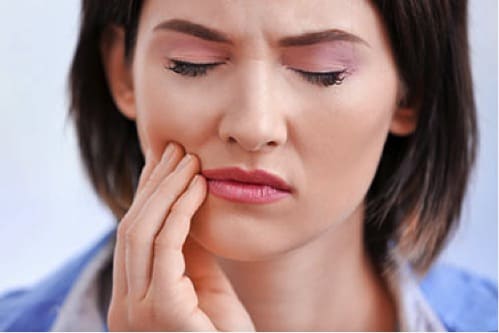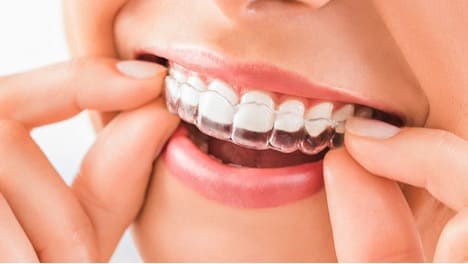Jaw Pain on one side
14
July
2021

Have you ever felt pain in your face? Especially in your jaw? Jaw pain can be sudden and sometimes alarming. Affecting your ability to eat, speak, and focus, jaw pain can be a small matter as well as a severe condition. It can happen on one side or both sides of the jaw. What does pain in one side of the jaw indicate?
What are the reasons behind jaw pain on one side?
-
TMJ disorders:
The temporomandibular joints on each side of the jaw connect your jawbone to your skull. In each joint, a disc separates the bones and helps to move the jaw adequately. When this disc becomes damaged or misaligned, it will result in severe pain and tenderness in your jaw.
This disc damage is due to several reasons:
Arthritis.
Teeth clenching.
Damage to the tissue.
Damage to the teeth.
Misalignment of the teeth.
Injury of the jaw.
Damage to the cartilage in the joint.
Other symptoms may also appear, such as:
Pain in the ears.
Pain, clapping or popping when eating or chewing your food.
Difficulty opening and closing your mouth.
-
Sinusitis:
Sinusitis is the inflammation in the nasal cavity due to a cold, allergies, or other conditions. The sinus cavities are located behind your cheeks, which are close to the jaw. As a result of their inflammation, you might feel pain in one or both sides of your jaw.
-
Dental problems:
Teeth pain is one of the worse types of pain. Four of the incisor teeth are located in the upper jaw, and four in the lower jaw. Any teeth issue will trigger jaw pain.
Dental problems include:
Cavities.
Abscesses.
Growth of wisdom teeth.
Gum disease.
Missing teeth.
Misaligned teeth.
Tooth grinding or clenching.
Issues with teeth also come along with other symptoms such as fever, the sensitivity of the jaw, swelling of the face, etc.
-
Trigeminal neuralgia:
Many areas of the body and organs are connected to the brain through cranial nerves. The trigeminal nerve transmits sensations of the face to the brain (such as pain sensation). It also helps the jaw muscles to move. Damage to this nerve can cause pain in all the face, including the jaw. It is often described as a shooting, jabbing sensation, or even an ache or burn. People who suffer from trigeminal neuralgia can sometimes feel pain when they touch their face or even move their facial muscles that become more severe with time. It can also cause twitching in the face and occur in waves that last for seconds or more.
-
Osteomyelitis:
Osteomyelitis is an infection of the bone due to bacteria. You can catch bacteria due to an injury to the jaw, dental health issues, or after dental surgery. This infection can spread and cause bone death. Osteomyelitis can also cause fever and swelling in the face. You shouldn’t wait to call your doctor if you experience these symptoms:
Constant pain in your jaw that becomes worse over time.
Tenderness in your jaw.
Redness or warmth at the painful area.
Fatigue.
Bad breath.
Pain and difficulty while opening and closing your mouth.
Numbness in your jaw, lips, or mouth.
-
Heart attack:
Jaw pain on one side can indicate a life-threatening condition. When a heart attack is about to happen, it may exhibit symptoms such as:
Jaw pain.
Chest pain.
Dyspnea.
Sweating.
Nausea.
Shoulders and back pain.
-
Cluster headaches:
Cluster headaches are a type of headache that causes pain in one side of the face or around the eyes. This pain can radiate to one side of the jaw. It can start at any time, even at night, and are extremely painful.
-
Tumors and Cysts:
Tumors and cysts can develop in different areas of your body. Although it is rare, it can also happen in your jaw. Some tumors and cysts are cancerous, and others can cause damage to the bones and tissues in your mouth. If you ever notice or experience any of these symptoms, you should check with your healthcare provider:
Red or white patches around your teeth.
Lumps or growth in your jaw.
Bleeding sores.
Swelling in your face or jaw.

How to treat jaw pain?
Multiple treatments could be suggested to treat jaw pain, depending on what’s causing it and how serious a condition is.
These treatments are the most common:
Heat: Use any towel or washcloth that would be protective enough, run it under hot water and apply it to your jaw in the pain area. Heat can have the effect of relaxing the muscles and easing the pain.
Cold: Another option would be cold compresses or ice packs. After placing the ice in a plastic bag, wrap it with a towel to protect your face from the cold, then apply it to the painful area. Cold compresses help with the pain and also with swelling.
Medications: some medications like over-the-counter pain relievers can help ease the pain. However, always consult your doctor before taking any medication, especially if it will be a treatment for several days.
Massage: Massaging the painful area can relax the muscles, helping with the pain and reducing the tension on the jaw. After checking with your doctor, you can do it yourself (after checking with your doctor) or go to a healthcare provider, physical therapist, or massage therapist.
Rest: Choosing foods that don’t require much chewing can help you avoid overworking your jaw muscles.
Try to relax: Relaxing your muscles can help relieve pain. You can try yoga, meditation, or journaling. If your pain is caused by stress, these activities should settle it.
Change your sleeping position: Your sleeping position can affect your jaw pain. If you always sleep on the same side, it will pressure the muscles, triggering jaw pain. Try changing your sleeping position to help relieve the pressure and ease the pain.
No caffeine: it’s no surprise that caffeine causes tension in muscles. It may also be the reason behind jaw pain. Avoiding it can be the solution to stop the pain. However, you may initially feel muscle tension from caffeine withdrawal when cutting it out of your diet.
Mouthguard: A mouthguard is a teeth protector custom-made for each one. It can be placed on the lower or upper teeth and can help from grinding teeth at night.
Botox injections: jaw pain due to TMJ may need a more invasive treatment to help relieve the pain. Botox injections may relax the jaw muscles keeping them from clenching. You will need to repeat this procedure several times, depending on the advice of your doctor.
Jaw surgery: In rare cases, when all the treatment would have failed, and the pain is still severe, your doctor may recommend surgery.
When should you see a doctor?
Jaw pain isn’t always severe, but sometimes, it could indicate a painful underlying condition, especially if it comes along with other symptoms. If your pain seems to stick for several days or comes and goes repetitively, don’t hesitate to consult your doctor or your dentist.
Here are some symptoms that you shouldn’t wait to get medically checked on:
You’re experiencing pain and difficulty while eating, drinking, swallowing, or breathing.
You can’t move or use your mouth in a way you did before.
You develop a fever.
There’s swelling in your jaw area or your face.
If the pain is unbearable or any of these symptoms show up, don’t wait for an appointment. Head directly to the emergency department, where you will be taken care of.

How to prevent jaw pain on one side?
Not all reasons are preventable. However, there are a few things you can do to avoid jaw pain.
-
Wearing a nightguard
If you grind or clench your teeth while you sleep, it will put much pressure on your jaw and cause pain. After checking with your dentist, wearing a nightguard can be an option to relax these muscles by protecting your jaw and stopping your teeth from clenching.
-
Managing stress
Some conditions of jaw pain are due to every day’s stress. By managing these stressful moments and days, you will help your body and muscles to relax. You can try meditation, yoga, or even
-
Follow up with your dentist regularly
Follow-up and regular check-ups with your dentist help keep your teeth, gum, and jaw in good condition and prevent potential oral problems. If you ever experience tooth or jaw pain on one side, schedule an appointment with your dentist before the condition worsens. Sometimes tooth extraction is necessary. If your jaw is hurting on one side, do not neglect it nor ignore it. Make sure to always listen to your body and take adequate steps in treating your pain.
If you or anyone you know is suffering from pain, call us today on (469) 562 4188 to book an appointment with our expert doctors.